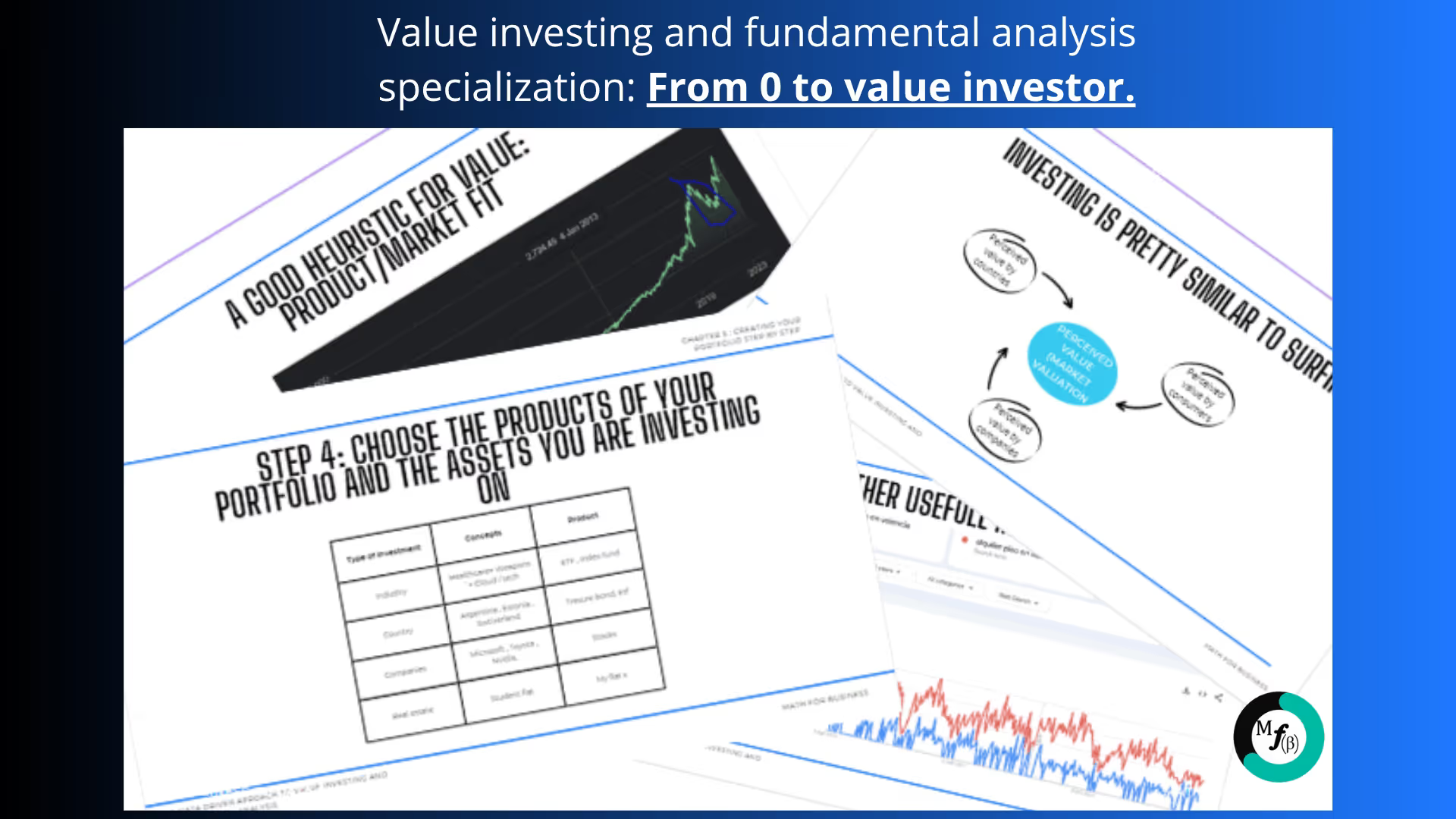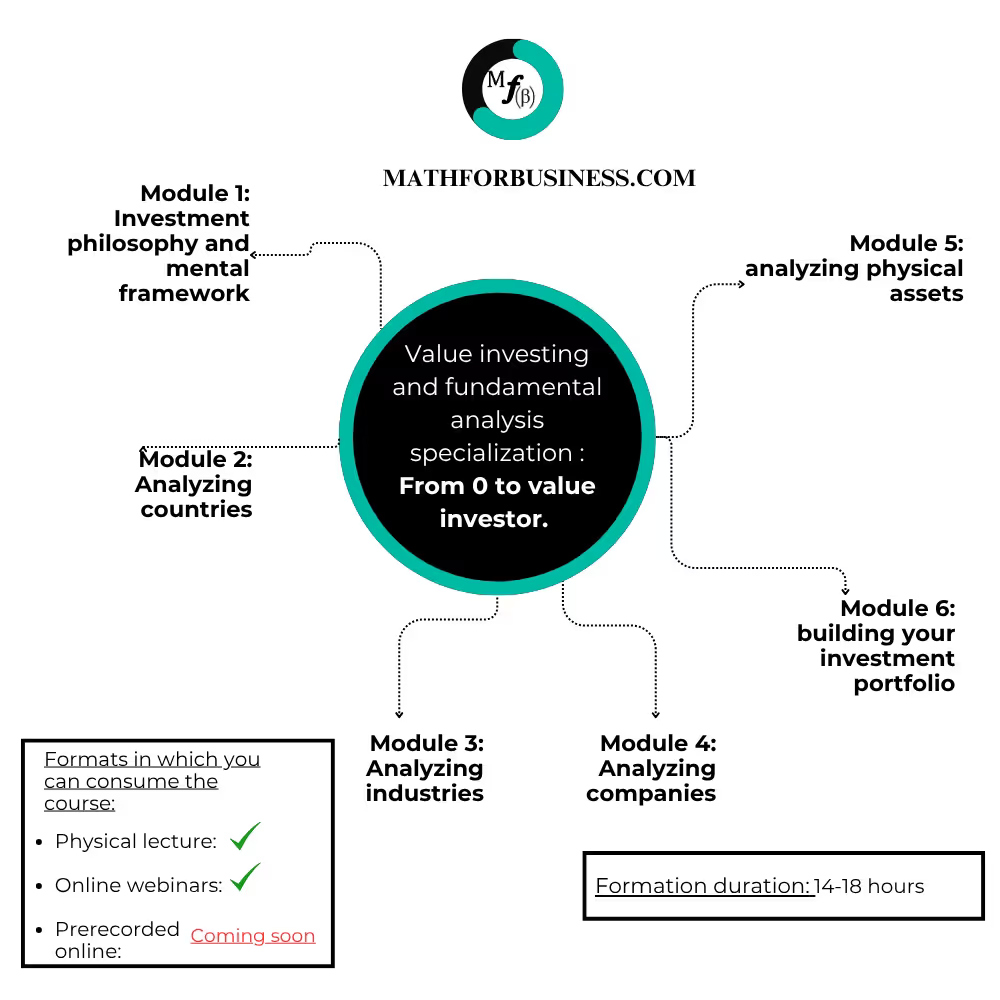Specialization in value investing and fundamental analysis:from 0 to value investor.
Learn how to study any business, market, or country and diagnose its opportunities and threats. The perfect course for anyone, regardless of skill level, who wants to learn to invest without tricks or get-rich-quick scams.

Introduced role:
Value investor
Anyone who wants to start investing and doesn't know how, or wants to get better.
Anyone, regardless of their level, who wants to learn to invest without tricks or get-rich-quick scams.
This is basically a beginner-to-intermediate course on how to start investing to obtain a second long-term source of income and, ideally, have enough money for retirement.
What is value investing? Why should you care?
In essence, it’s about understanding what humans and societies value, and leveraging that knowledge as opportunities when there appear to be differences between the value of something and how the markets value it.
In long-term investing, this usually translates to finding opportunities with high growth potential and the possibility of providing enough value to society to expect a long-term increase in market valuation as that potential begins to materialize. It means debunking dogmas and market-assumed realities or taking steps to prepare for a crisis that could affect us before it materializes in the market valuation.
Essentially, it’s about investing in what we consider useful enough for humans to realistically influence its valuation positively in our favor. It is a fascinating branch of financial analysis that sometimes forces investors to ask philosophical questions such as: “What is truly valuable to a person? Why? Why is there a difference between this hypothesis and the current market valuation?”
How will we do this?

Looking into the curriculum in detail:
Module 1: Investment philosophy and mental framework
What is value? Why do people pay for some things and not for others? What motivates us? What is a good investor?
This first chapter is my favorite; there is no "investing" without a clear purpose that leads us to do it. This chapter goes deep into the mindset required for a value investor, based on the Bogglehead manual and advice from the best investors.
We will talk about biology, history, and sociology to get a clear idea of what value is and what we should try to do to benefit from it.
Module 2: Analyzing countrie
A financial product, a company, or a particular industry does not operate in isolation.
The countries that benefit from or are harmed by their existence, their respective economic and military power (in terms of both societies and governments), the legal framework, etc., can affect the evolution of those opportunities. The economy of a country will have significant effects on investment, savings, and consumption possibilities for its citizens, and its sociological values and well-being will affect their motivations.
Understanding a country's performance in all of these areas will be key to analyzing the value of an opportunity. In this chapter, we’ll learn how to diagnose a particular country’s performance, its strengths, weaknesses, threats, and opportunities. What metrics to check, which sources to consult, etc. This will give you enough knowledge to begin investing in currencies and treasury bonds.
Module 3: Analyzing industries
Now we will go deeper into real opportunities.
We’ll learn how to research any industry to understand its future, opportunities, and threats, by understanding the context of each country.
We’ll learn about different financial products we can use to invest directly in specific industries, as well as metrics and indicators.
After this chapter, you’ll have the knowledge necessary to assess the value of specific industries and their long-term trends—everything needed to start investing in ETFs and indices.
Module 4: Analyzing companies
Here we move into the penultimate level of analysis, focusing on companies within specific sectors and their teams.
We’ll learn what makes a company successful, how competitive advantages are generated, and which ones we should look for. We’ll also learn all the classic metrics and ratios of fundamental analysis used to diagnose the solvency and financial situation of any company, and we’ll study the investment methodologies of the greatest investors in history (Lynch, Buffet, B. Graham).
We will also teach you how to combine these analyses with those discussed in previous chapters.
Module 5: analyzing physical assets
The last level of analysis is investing in physical products.
Here, we’ll use the example of the real estate sector to demonstrate how to conduct proper analysis and research to ensure value when investing in physical products.
The methodologies will be easily transferrable to any physical industry you are interested in.
Module 6: building your investment portfolio
Final course summary where we’ll look step-by-step at how to build and decide on our portfolio. We’ll cover the concepts needed to make this a real and repeatable process.
What will you be able to do after you finish this course?
You will be able to build a solid investment portfolio and turn your investments into a potential retirement fund.
Study potential medium and long-term investment opportunities and make the most of them without losing all your savings and while earning profits. You will have the knowledge necessary to step away from the market and see it from a different and more critical perspective. Ideally, this will change the way you think about the economy and money in general, giving you a new appreciation of value. Even if that's too ambitious, at least you’ll become a more competent long-term investor.
Price: 450 euros
The price includes necessary sessions to deliver the course ( 4 to 6), doesn't include relocation for offline sessions. Online webinars have no additional costs.

Be as competitive as these industry leaders:
Here are some giants we have worked with during our career
Opinions of the instructor on Linkedin
Real feedback from professionals who have worked with us

Julio Granados
Solutions Architect, Databricks
Stefano is a highly skilled professional, proactive individual with a great attitude, always willing to lend a hand to any colleague who needs it. He fosters a very pleasant work environment and is attentive to all aspects of the job, both technical and functional. It has been a true pleasure working with him.

Carlos Javier Soto
AI software Engineer, CaixaBank
Stefano is a highly skilled professional with excellent technical expertise and soft skills, which allowed him to excel in the role of Technical Solution Manager within the squad we worked on together for the CaixaBank Tech Document IA Project. I wish him all the best and highly recommend him for his outstanding professional and personal qualities.

Iker Zabala
Head of customer Data engineering, Stellantis
Stefano proved to be a reliable and efficient resource during our work together. He can handle strategic tasks in a trustworthy manner. Easy to delegate on. He also identified big risks and proposed solutions.

Harish Bagran
Data engineer, Stellantis
Stefano and I worked for more than 6 months together. Build a robust Data pipeline for different Power Bi dashboards. He has great analytics and debugging skills. Shows great work ethics and professionalism.

Georvic Tur
Staff Data engineer, Tools for humanity
Stefano is an impressive person in many ways. Perhaps the most remarkable is how he combines his natural leadership skills, his gift for communication, and his excellent scientific abilities. In this regard, he makes a tremendous effort to clearly communicate complex technical aspects in the areas of data engineering and data science to end clients, and he achieves success every time he does so.

Carlos Salvador Martinez
Asesor comercial, Agentes exclusivos Allianz
We've been working with him for almost a year now, and he's been incredibly dedicated. His contribution to restructuring the business and the brand has been invaluable. We operate with much greater expertise since he joined us, both in our approach and in the improvements we implement. His jokes are terrible.

Pedro Rodriguez Brazon
Area manager Zona Este y Canarias, Cosplava S.L.U
Excellent professional, contributes good ideas and develops methodologies to carry them out, is punctual, creative and methodical, as well as passionate about what he does.

Julio Granados
Solutions Architect, Databricks
Stefano is a highly skilled professional, proactive individual with a great attitude, always willing to lend a hand to any colleague who needs it. He fosters a very pleasant work environment and is attentive to all aspects of the job, both technical and functional. It has been a true pleasure working with him.

Carlos Javier Soto
AI software Engineer, CaixaBank
Stefano is a highly skilled professional with excellent technical expertise and soft skills, which allowed him to excel in the role of Technical Solution Manager within the squad we worked on together for the CaixaBank Tech Document IA Project. I wish him all the best and highly recommend him for his outstanding professional and personal qualities.

Iker Zabala
Head of customer Data engineering, Stellantis
Stefano proved to be a reliable and efficient resource during our work together. He can handle strategic tasks in a trustworthy manner. Easy to delegate on. He also identified big risks and proposed solutions.

Harish Bagran
Data engineer, Stellantis
Stefano and I worked for more than 6 months together. Build a robust Data pipeline for different Power Bi dashboards. He has great analytics and debugging skills. Shows great work ethics and professionalism.

Georvic Tur
Staff Data engineer, Tools for humanity
Stefano is an impressive person in many ways. Perhaps the most remarkable is how he combines his natural leadership skills, his gift for communication, and his excellent scientific abilities. In this regard, he makes a tremendous effort to clearly communicate complex technical aspects in the areas of data engineering and data science to end clients, and he achieves success every time he does so.

Carlos Salvador Martinez
Asesor comercial, Agentes exclusivos Allianz
We've been working with him for almost a year now, and he's been incredibly dedicated. His contribution to restructuring the business and the brand has been invaluable. We operate with much greater expertise since he joined us, both in our approach and in the improvements we implement. His jokes are terrible.

Pedro Rodriguez Brazon
Area manager Zona Este y Canarias, Cosplava S.L.U
Excellent professional, contributes good ideas and develops methodologies to carry them out, is punctual, creative and methodical, as well as passionate about what he does.

Julio Granados
Solutions Architect, Databricks
Stefano is a highly skilled professional, proactive individual with a great attitude, always willing to lend a hand to any colleague who needs it. He fosters a very pleasant work environment and is attentive to all aspects of the job, both technical and functional. It has been a true pleasure working with him.

Carlos Javier Soto
AI software Engineer, CaixaBank
Stefano is a highly skilled professional with excellent technical expertise and soft skills, which allowed him to excel in the role of Technical Solution Manager within the squad we worked on together for the CaixaBank Tech Document IA Project. I wish him all the best and highly recommend him for his outstanding professional and personal qualities.

Iker Zabala
Head of customer Data engineering, Stellantis
Stefano proved to be a reliable and efficient resource during our work together. He can handle strategic tasks in a trustworthy manner. Easy to delegate on. He also identified big risks and proposed solutions.

Harish Bagran
Data engineer, Stellantis
Stefano and I worked for more than 6 months together. Build a robust Data pipeline for different Power Bi dashboards. He has great analytics and debugging skills. Shows great work ethics and professionalism.

Georvic Tur
Staff Data engineer, Tools for humanity
Stefano is an impressive person in many ways. Perhaps the most remarkable is how he combines his natural leadership skills, his gift for communication, and his excellent scientific abilities. In this regard, he makes a tremendous effort to clearly communicate complex technical aspects in the areas of data engineering and data science to end clients, and he achieves success every time he does so.

Carlos Salvador Martinez
Asesor comercial, Agentes exclusivos Allianz
We've been working with him for almost a year now, and he's been incredibly dedicated. His contribution to restructuring the business and the brand has been invaluable. We operate with much greater expertise since he joined us, both in our approach and in the improvements we implement. His jokes are terrible.

Pedro Rodriguez Brazon
Area manager Zona Este y Canarias, Cosplava S.L.U
Excellent professional, contributes good ideas and develops methodologies to carry them out, is punctual, creative and methodical, as well as passionate about what he does.
Frequently asked
questions
Nope, we can help you build your data and math culture into your team, and help you recruit if you are starting from scratch. If you already have a team we can train them for you
Some of them are oriented to a more technical role in your data team, and others, like our data-driven team's, are focused on management and leaders that don't need to get down and dirty with code.
Depending on the quantity of work we are dealing with, or our internal experimentation, we have from time to time a beta-testing program where we allow lucky users to test a course, service, or workshop in exchange for feedback and, if satisfaction is achieved, a referral. Ask us about it to see if you apply.
Simple, our data-driven team's master program. It will teach you everything you need to get started and you will have 5 sessions with us to help land any concept you did not understand into your organization, it's by far the best program to transform an organization on the internet.